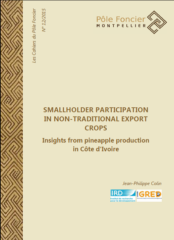
The growth of non-traditional export agro-commodities in developing countries, as well as the major shift from state-controlled outgrower schemes to contractual farming by private companies, raise questions regarding the impacts of agro-export booms and contract production on small-scale producers. This paper highlights the role played by path dependency and institutional innovation in the shift from an outgrower scheme for canning pineapple production, to fresh pineapple export production organised through a web of multistrand relations between growers, labourers, landlords, product buyers, cooperatives. This case questions the sustainability of non-traditional small-scale export production, when faced with more and more exacting demand on the global market.
